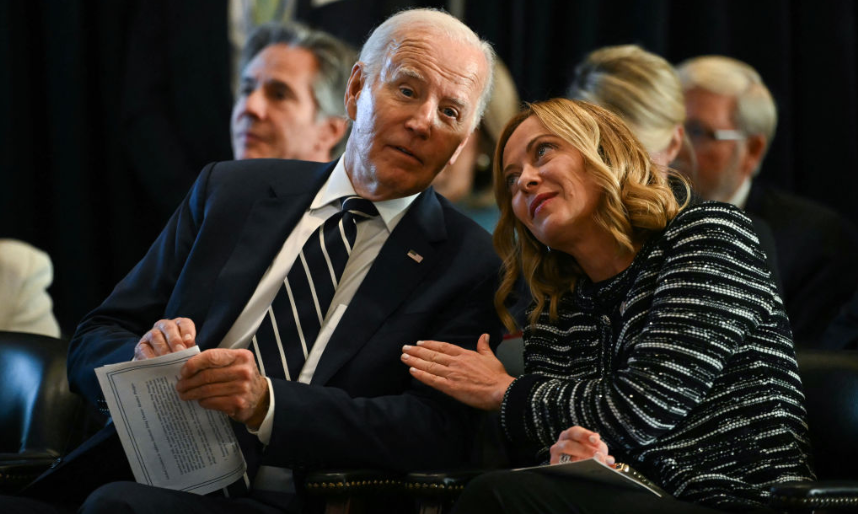Source: The Economist
Vladimir Putin, Russia’s president, is sure to be cock-a-hoop on October 22nd when he poses for photographs with the leaders of perhaps 24 countries including Narendra Modi of India and Xi Jinping of China at the BRICS summit in Kazan on the Volga river. Last year, when the bloc met in Johannesburg and expanded from five to ten members, Mr Putin had to stay home to avoid being arrested on a warrant issued by the International Criminal Court in The Hague. This time he will hope to be seen playing a leading role in a rapidly growing club that is challenging the dominance of the Western-led order.
Now in their 15th year together, the original BRICS (Brazil, Russia, India, China and South Africa) have achieved little. Yet at this summit Mr Putin hopes to give the bloc heft by getting it to build a new global financial-payments system to attack America’s dominance of global finance and shield Russia and its pals from sanctions. “Everyone understands that anyone may face US or other Western sanctions,” Sergei Lavrov, Russia’s foreign minister, said last month. A BRICS payments system would allow “economic operations without being dependent on those that decided to weaponise the dollar and the euro”. This system, which Russia calls “BRICS-Bridge”, is intended to be built within a year and would allow countries to conduct cross-border settlement using digital platforms run by their central banks. Controversially, it may borrow concepts from a different project called mBridge that is part-run by a bastion of the Western-led order, the Bank for International Settlements (BIS).
The talks will shine a light on the race to remake the world’s financial plumbing. China has long bet that payments technology — not a creditors’ rebellion or military conflict — will reduce the power that America gets from being at the centre of global finance. The BRICS plan could deliver cheaper and faster transactions. Those benefits may be enough to entice emerging economies. In a sign the scheme has genuine potential, Western officials are wary that it may be designed to evade sanctions. And some are frustrated by the unintended role of the BIS, a Swiss-based organisation known as the central bank for central banks.
America’s dominance of the global financial system has been a mainstay of the post-war order. It reflects its economic and military heft, but also the fact that dollar-denominated assets such as Treasuries are seen as safe from government confiscation and inflation and are easy to buy and sell. Though central banks have diversified their holdings, including into gold, around 58% of foreign-currency reserves are in dollars and the network effects of the dollar put American banks at the centre of the world’s payments systems. Sending money around the globe is a bit like taking a long-haul flight; if two airports are not directly linked, passengers will need to change flights, ideally at a busy hub where lots of other planes connect. In the world of international payments the biggest hub is America, where many of the world’s banks swap foreign currencies from those making payments into dollars and then into the currencies in which the payments are received.
The centrality of the dollar provides what Henry Farrell and Abraham Newman, two scholars, call “panopticon” and “choke point” effects. Because almost all banks transacting in dollars have to do so through a correspondent bank in America, it is able to monitor flows for signs of terrorist financing and sanctions-evasion. That provides America’s leaders with an enormous lever of power — one that they have been keen to pull as an alternative to going to war. The number of people under American sanctions has exploded by more than 900% (to around 9,400) in the two decades to 2021. America has demanded that some foreign banks are disconnected from SWIFT, a Belgium-based messaging system used by some 11,000 banks in 200 countries to transfer funds across borders. In 2018 SWIFT cut off Iran.
All this paled in comparison with the ferocity of the financial attack on Russia after its invasion of Ukraine in 2022. The West froze $282bn of Russian assets held abroad, disconnected Russian banks from SWIFT and prevented them from processing payments through America’s banks. America has also threatened “secondary sanctions” on banks in other countries that support Russia’s war effort. Even European policymakers, who support sanctions, were alarmed at how fast Visa and MasterCard-two American firms that the euro zone relies on for retail payments-closed shop in Russia. And the tsunami crashing over Russia has prompted America’s adversaries to accelerate their efforts to move away from the dollar, and pushed many other governments to look at their dependence on American finance. China views it as one of its biggest vulnerabilities.
Mr Putin is hoping to capitalise on this dollar dissatisfaction at the BRICS summit. For him creating a new scheme is an urgent practical priority as well as a geopolitical strategy. Russia’s foreign-exchange markets now almost exclusively trade yuan, but because it cannot get enough of this currency to pay for all of its imports, it has been reduced to bartering. In October Russia agreed to buy mandarins (the citrus fruit) from Pakistan paid for with chickpeas and lentils. According to some reports these liquidity strains are growing.
Mr Putin hopes to make life outside the American system more bearable by laying some financial plumbing of his own. BRICS officials have held a flurry of meetings ahead of the summit in Kazan. They have discussed creating a credit-ratings agency to rival the main Western ones, which Russia sees as “susceptible to politicisation”. They also examined creating a reinsurance firm to sidestep Western ones that are blocked from reinsuring some tankers transporting Russian oil, and a payments system to replace Visa and MasterCard. Mr Putin has pushed for creating a common BRICS currency for pricing trade, based on a basket of gold and other non-dollar currencies, but Indian officials objected to this in recent weeks.
By far the most serious initiative is a plan to use digital money backed by fiat currencies. This would place central banks, not correspondent banks with access to the dollar clearing system in America, in the middle of cross-border transactions. In decentralising the financial system, the proposal would mean that no one country could disconnect another. Since commercial banks would transact through their own central banks, they would not need to maintain bilateral relationships with foreign banks, side-stepping the network effects of the current correspondent-banking system.
The “BRICS Bridge” plan was outlined in a report by the Russian finance ministry and central bank in October. Running to 48 pages it critiques Western finance and states that “a new multinational platform for the purposes of cross border settlement needs to be examined in further detail due to its novelty, associated risks, and, potentially, game-changing economics”. With its focus on digital currencies run by central banks it appears to be at least partially inspired by an experimental payments platform called mBridge, which was developed by the BIS alongside the central banks of China, Hong Kong, Thailand and the United Arab Emirates. Chinese state media say that the new BRICS plan “is likely to draw on the lessons learned” from the mBridge project by the BIS.
That BIS experiment was innocent in design and initiated in 2019, before Russia’s full-scale invasion. It has been stunningly successful, according to several people involved in the project. It could cut transaction times from days to seconds and transaction costs to almost nothing. In June the BIS said mBridge had reached “minimum viable product stage” and Saudi Arabia’s central bank joined as a fifth partner in the scheme. Some 31 other members are observers. By creating a system that could potentially be far more efficient than the current one — and which would weaken the dominance of the dollar-the BIS has unwittingly stepped into a geopolitical minefield.
“If someone is transacting outside of the dollar system for political reasons, you want that to be more expensive for them than the dollar system,” says Jay Shambaugh, a senior treasury department official. The efficiency gains of new kinds of digital money may erode the use of the dollar in cross-border trade, according to the Fed. Reciprocally they could boost China’s currency. Speaking to bankers and officials about mBridge in September, a Hong Kong official said it “provides another opportunity to allow the easier use of the renminbi in cross-border payment, and Hong Kong as an offshore hub stands to benefit”.
Is it possible that mBridge’s concepts and code may be replicated by the BRICS, China or Russia? The BIS doubtless views mBridge as a joint project and believes that it has the ultimate say over who can join. Yet some Western officials say that participants in the mBridge trial may be able to pass on the intellectual capital it involves to others, including participants in the BRICS Bridge. According to multiple sources China has taken a lead on the software and code behind the mBridge project. The People’s Bank of China, the central bank, leads the project’s technology subcommittee and, according to comments made by a BIS official in 2023, its digital ledger “was built by” the PBOC. Perhaps this technology and know-how could be used to build a parallel system beyond the reach of the BIS or its Western members. The BIS has declined to comment on any similarities between its experiment and Mr Putin’s plan.
The BRICS’s foray into the payments race reveals the new geopolitical challenges facing multilateral organisations. At a meeting of the G20 group of large economies in 2020, the BIS was given the job of both improving the existing system and, at China’s urging, of experimenting with digital currencies. Earlier this year Agustín Carstens, its boss, called for “entirely new architectures” and a “fundamental rethink of the financial system”. Yet as different members of the organisation have rival objectives, staying above the fray is getting harder. The world has become more difficult to navigate, acknowledges Cecilia Skingsley, the boss of the BIS Innovation Hub. But she says it still has a role to play in solving problems for all countries “almost independent of what other kind of agenda they might have”.
One option for America and its allies is to try to hobble new payment systems that compete with the dollar. Western officials have warned the BIS that the project could be misused by countries with malign motives. The BIS has since slowed down its work on mBridge, according to some former staff and advisers, and is unlikely to admit any new members to the project. Another option is to improve the dollar-based system so that it is as efficient as new rivals. America is already gearing up to compete. In April the New York Fed joined six other central banks in a BIS project aimed at making the existing system faster and cheaper. The Federal Reserve may also link its domestic instant-payments system with those in other countries. SWIFT said this month that it plans to conduct trials of digital transactions next year, leveraging some of its incumbent advantages including strong network effects and trust, says Tom Zschach, its innovation chief.
Any rival BRICS payments system will still face huge challenges. Guaranteeing liquidity will be difficult or require large implicit government subsidies. If the underlying flows of capital and trade between two countries are imbalanced, which they usually are, they will have to accumulate assets or liabilities in each others’ currencies, which may be unappealing. Distrust of China runs deep in India, a key BRICS member. And to scale a digital-currency system, countries must agree on complex rules to govern settlement and financial crime. Such unanimity is unlikely to win the day in Kazan.
Yet, for all that, the BRICS scheme may have momentum. There is a broad consensus that the current cross-border-payments system is too slow and expensive. While rich countries tend to focus on making it quicker, many others want to overturn the current system entirely. At least 134 central banks are experimenting with digital money, mostly for domestic purposes, reckons the Atlantic Council, a think-tank. The number working on such currencies for cross-border transactions has doubled to 13 since Russia’s invasion of Ukraine. This week’s BRICS summit is no Bretton Woods. All that Russia and its pals have to do is move a relatively small number of sanctions-related transactions beyond America’s reach. Still, many are aiming higher. Next year the BRICS summit will be held in Brazil, chaired by its president Luiz Inácio Lula da Silva, who fulminates over the power of the greenback. “Every night I ask myself why all countries have to base their trade on the dollar,” he said last year. “Who was it that decided?”








No comments.
By submitting a comment you grant Free West Media a perpetual license to reproduce your words and name/web site in attribution. Inappropriate and irrelevant comments will be removed at an admin’s discretion. Your email is used for verification purposes only, it will never be shared.